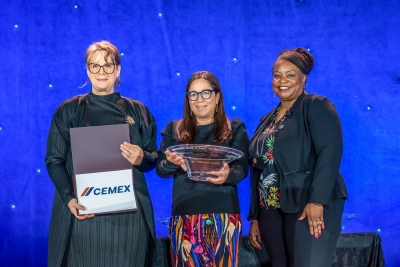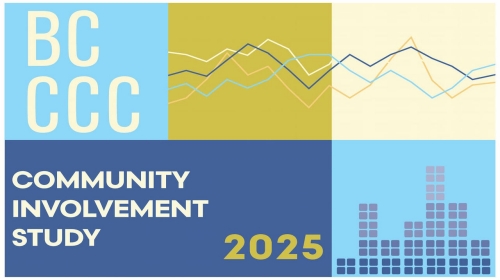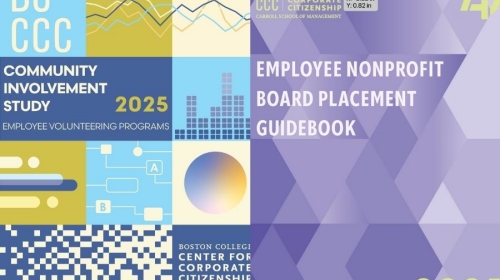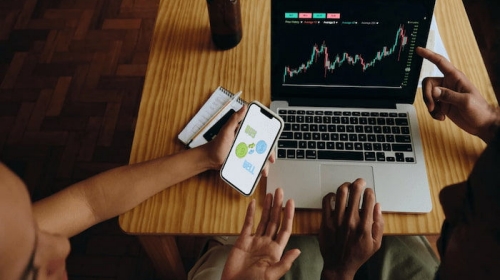WEBINAR: This webinar explores how corporate giving will be reshaped by the One Big Beautiful Bill. Hear directly from corporate citizenship leaders as they share innovative, real-world strategies that deliver impact for communities and results for business.
The 2024 Innovation Awards Winners

Innovation is the process that an individual or organization undertakes to conceptualize new products, programs, processes, or ideas. For the past three years, BCCCC has been honoring companies that apply their business resources to solve social and/or environmental problems in innovative ways. As part of this year’s International Corporate Citizenship Conference, the Wells Fargo Foundation sponsored the 2024 Innovation Awards. Corporate citizens from BCCCC’s advisory boards acted as judges in evaluating dozens of competitive submissions from companies around the world. They reviewed each submission for its program design and creativity, tangible outcomes, disruption potential, and overall corporate citizenship.
On Sunday, April 28, 2024, BCCCC’s Executive Director, Katherine V. Smith, and Wells Fargo’s Executive Vice President, Head of Philanthropy & Community Impact, Darlene Goins, announced the following winners for 2024:

Eco-Innovator Winner: CEMEX Egypt
The Nile River has been significantly affected by pollution over the years, which has had a considerable impact on the local ecosystem, marine life, and water quality for those who rely on it. Cemex Egypt joined forces with VeryNile, a preservation and waste collection initiative, to help combat this pollution.
Together, they expanded their operation to accommodate the large scale of waste collected, and provide assistance to the people in the region. Since January 2024, the project has successfully removed more than 400 tons of waste from the Nile River, created 150 jobs, and converted 250 tons of non-recyclable waste into alternative fuels. Also, as of this year, with Cemex’s support, VeryNile has expanded to Assiut and Sohag, and their operations in Qursaya have been renovated to accommodate the large scale of waste collected and the people working there.
“At Cemex, we’re working on building a more sustainable future in line with our climate-action program ‘Future in Action,’” the company shared, as part of its submission. “Since we started our partnership with VeryNile, we wanted to expand the initiative to all cities on the Nile Valley. We are delighted to see the initiative embracing economic, social, and environmental angles. We are committed to build on a shared goal of preserving the Nile.”

Innovation Amplifier Winner: The Clorox Company and Burt’s Bees
In Africa, shea is often referred to as “women’s gold” since it has been a vital source of income for women living in remote areas for centuries. While 16 million women work in the industry, it is men who mainly manage beekeeping worldwide. Burt’s Bees is a Clorox brand known for using natural ingredients like beeswax and shea butter in their products. In an effort to shift this gender dynamic, Burt’s Bees launched the SheKeeper program—a collaboration with Partnership for Natural Ingredients and USAID to improve biodiversity, diversify income for Ghanaian women and youth through beekeeping, upgrade shea production, and enhance export trade opportunities. Through SheKeeper, 1,221 women and people between 18-29 have been trained and provided with safe and responsible beekeeping equipment. Additionally, the initiative has seen Burt’s Bees build 6,900 hives, establish two beeswax/honey processing centers, and upgrade shea production.
“Our commitment to sustainable innovation manifests in our efforts to enhance biodiversity, fuel equitable growth, and champion human and labor rights in our supply chains,” shared Niki King, Vice President & Head of Sustainability at The Clorox Company. “The SheKeeper program not only opens the door for greater economic empowerment of women and youth, but also offers a responsible sourcing framework with the potential to scale across our portfolio of brands.”

Transformative Partnerships Winner: Sanofi
Community Health Workers (CHWs) are essential public health workers who provide health education to residents in underserved communities. However, their ability to serve is sometimes limited due to a lack of infrastructure—constraining their capacity, professional development, and coordination. Since 2022, Sanofi has partnered with the National Association of Community Health Workers (NACHW) to support the development of a national platform that increases the capacity of CHWs, strengthens emergency mobilization, and improves coordination among CHWs across the United States. Together, Sanofi and NACHW have worked with groups to build trust and ensure that the voices of community health workers are at the center of the design process for NACHW’s new CHWConnector digital platform. The platform will launch in June 2024 to unite, educate, support, sustain, and advance the CHW workforce.
“Our partner NACHW reminds us that supporting the livelihood and career pathways of CHWs today means a more diverse and effective public health workforce tomorrow. We look forward to when a new digital home breaks ground for community health workers, supporting their livelihood and the improved health and well-being of their communities,” shared Barb Short, Senior Director of Corporate Social Responsibility at Sanofi. “When it does, our people will be there in allyship, in support of the vision NACHW holds for its activation and impact, and the vision CHWs hold for their own future.”

Social Impact Changemaker Winner: CEMEX Colombia
Since 2021, Cemex Colombia’s “Building Social Infrastructure Together” program has been providing access to construction materials—working in partnership with local authorities and organizations to develop and improve sustainable and resilient infrastructure services. This program has developed a network to address the quality of life of communities whose housing conditions, access roads, or community spaces required improvement, and who can now self-manage with the materials provided. This work has impacted nearly 200,000 people in Colombia, through 109 social infrastructure projects.
The program aims to align with SDG 11: Creating Sustainable Cities and Communities. “To this end, we have focused our actions and resources on three lines of intervention: decent floor solutions for households in our area of influence, who are in extreme poverty and whose homes still have dirt floors; construction of placa huellas to improve the transit and stability of rural roads, tertiary roads or paths in areas of difficult access; and improvement of community facilities (community halls, health centers, toy libraries),” the company shared in its submission.

Innovation Amplifier Runner-Up: Blue Cross Blue Shield of Louisiana (BCBSLA)
At the height of the COVID-19 pandemic, Louisiana's hospitals and clinics had more than 6,000 open nursing positions. With nearly a third of registered nurses reporting that they plan to leave the profession within a year because of burnout and exhaustion, the data was clear: the healthcare industry needed more registered nurses.
However, according to the American Association of Colleges of Nursing (AACN), more than 91,000 qualified applicants were turned away from nursing school in 2021. How could the industry afford to let go of so many capable, willing applicants in the face of a staffing crisis? And why were they turned away to begin with?
Representatives from economic agencies, hospitals, and universities came together to make a plan. The initial idea on the table was to lobby the Louisiana State Board of nursing to increase the ratio of students to clinical instructors—perhaps one to fifteen. But the nursing schools wanted to ensure the highest quality instruction for their students in clinical training, so they offered an alternative of sharing adjunct faculty and creating additional nursing rotations. As a funding partner, BCBSLA saw the powerful success of this solution and knew it could be replicated across the state.
By funding the work and elevating it as a best practice solution, BCBSLA helped its partners graduate an additional 800 nurses within two years. As additional coalitions have adopted the program, studies on Louisiana’s nursing shortfall have started to trend upward, some suggesting that this work has played a role in nearly halving the anticipated shortfall by 2030.
“Louisiana’s nursing shortage isn’t just driving a crisis of available care, it also contributes to the skyrocketing cost of that care,” explained Michael Tipton, BCBSLA Foundation President. “Where nurses are in short supply and talent is being imported from elsewhere, the costs are substantially higher, which matriculates into the overall cost of insuring our friends, family, and neighbors. These partnerships and investments are making highly qualified, culturally competent care more readily available, while also improving the quality of care, providing employment opportunities locally and holding the line on costs in our state.”

Eco Innovator Runner-Up: Southwest Airlines
For ten years, Southwest Airlines’ Repurpose with Purpose program has donated aircraft seat leather to community partners across the United States and Central America, where it is upcycled into new products. This program has helped divert over 1.4M pounds of leather from being sent to landfills, thereby minimizing waste.
Repurpose with Purpose also maximizes social impact by partnering with nonprofit and community organizations that support different groups of people. These organizations upcycle the leather into new products while providing employment, skills training, and other benefits for community members.
In its submission, the company shared two examples of the impact of the Repurpose with Purpose program:
“After Southwest and non-profit Unshattered were featured on the Kelly Clarkson show in December 2023, Unshattered sold 642 products, resulting in $41.3K in sales. This broke their record for total monthly sales by over 30%. Also, since 2018, Help Heal Veterans has used over 24,000 Southwest seats to create over 246,000 art therapy kits which are sent to veterans and active-duty military.”

Transformative Partnership Runner-Up: FTI Consulting
Code.org is a non-profit organization dedicated to providing students the opportunity to learn computer science for free. The organization required support to expand into new countries and engaged in a partnership with FTI Consulting to bring their curriculum to countries across the Europe, the Middle East, and Africa (EMEA) region.
FTI Consulting supported Code.org in a pro bono capacity to identify new countries that would benefit from integrating computer science into their existing education systems and, crucially, to foster new relationships with private and public sector entities to create country-specific implementation plans.
Through the partnership, FTI Consulting has worked with Code.org to garner interest to implement the curriculum from more than 20 countries, and Code.org formally launched in the United Arab Emirates (UAE). Both organizations are committed to an ongoing partnership to continue expanding Code.org’s resources globally.
“Striving to give every child around the world an opportunity to learn coding and computer science is a very ambitious goal, but the impact it will have in today’s disadvantaged regions and communities will be colossal in terms of its ability to develop critical skills at an early age and provide access to the increasingly highly skilled world of work. At FTI Consulting, we are fully committed to this effort,” said Alberto Pamias, Senior Managing Director, Corporate Finance and Restructuring, FTI Consulting.

Social Impact Changemaker Runner-Up: The National Gas Company of Trinidad and Tobago (NGC)
Technological advances have led to some rapid shifts in the job market. The rise of automation is trending toward the obsolescence of factory work and—in similar fashion—the growth of artificial intelligence may soon spell out losses for a large block of rote jobs, such as data entry.
NGC's Inspire-2-Achieve (I2A) Integrated Youth Development Program focuses on equipping participants with the skills, competencies, behaviors, and attitudes required to compete in a newer, AI-driven business world. Skills such as problem-solving, collaboration, critical thinking, digital savvy, entrepreneurship, and environmental stewardship were included in the program's integrated learning approach. The company identified a key challenge in removing the barrier to entry for tomorrow's youth and in providing them—especially those living in areas where opportunity may be scarce—with the ability to pursue these topics.
“Young people are inheriting a world marked by economic, social, and environmental volatility; uncertainty; complexity; and ambiguity,” shared Mark Loquan, President of NGC. “The task of achieving climate adaptation and creating a safer, more prosperous and sustainable world will fall on the shoulders of the youth. I2A has been developed to provide support for the task at hand.”
“Our solution was simple, to create a space for the youth in NGC’s fence-line communities so that they could be provided with the space to learn and deepen their understanding of key skills that are useful in the world of work,” the company shared in its submission.
Program participants have gone on to showcase their learning through the hosting of community demonstration projects. These demonstration projects have also served as a source of inspiration for peers in the community who may now also consider pursuing education, careers, and entrepreneurship in STREAM and Sustainability fields—newly viable options for earning a livelihood, while helping to solve challenges at the community, national, and global levels.
Related Content
This study explores shifting trends in employee volunteering, corporate giving, and other means of corporate community involvement.
This guidebook offers insights on placing employees in nonprofit board service roles.
This Member Meetup focused on strategies for building compelling business cases for corporate social responsibility initiatives. Two organizations shared their approaches to securing leadership buy-in and funding for CSR programs by anchoring requests in business strategy, quantifying value, and crafting persuasive narratives.
RESEARCH BRIEF - To examine whether CSR Activities affect Long-term Stock Returns, researchers studied 6971 observations of common stock of Japanese firms operating globally, along with accounting data and ownership data.
RESEARCH BRIEF - The study utilized a dataset of 28 globally listed airlines with 420 firm-year observations of ESG data over time.
Check out the latest findings and best practices from BCCCC's Community Involvement Board, comprised of corporate leaders working in corporate giving, community relations, and related roles.
Check out the latest findings and best practices from BCCCC's ESG Reporting Board, comprised of corporate leaders working in sustainability reporting.






